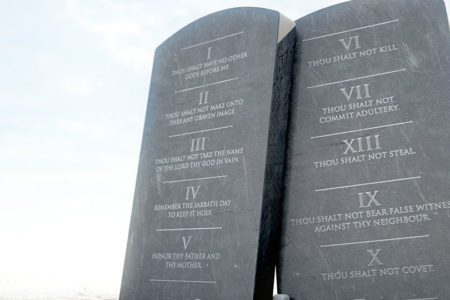Israel: The Forever Nation Romans 11:1–10
Three reasons why there will always be an Israel
The outside temperature was near zero, but it didn’t feel much warmer inside as I looked at the man sitting across the table from me at a Tim Hortons coffee shop. His icy glare communicated clearly his attitude toward Israel. “Why should I care about the Jews?” he asked. “God doesn’t.”
From a purely human perspective, the Jewish plight over the past 2,000 years might lead some to assume God has turned His back on His Chosen People. Key Bible passages, however, prove otherwise. In fact, there are at least three reasons why you can be certain God has not rejected Israel.
Reason #1: The Covenants
In his letter to the Romans, the apostle Paul asked, “I say then, has God cast away His people?” (Rom. 11:1). He quickly answered his own question, “Certainly not!” The Greek expression implies the idea is so unthinkable and absurd it shouldn’t even enter your mind.
Paul’s affirmation was not idealistic or wishful. He understood the four unconditional, unilateral covenants God had made with Israel, in which God Himself was the sole guarantor.
The Abrahamic Covenant
It guarantees a seed, a land, and a blessing to Abraham and was reiterated to Isaac and Jacob (Gen. 12:1–3; 12:7; 13:14–17; 15:1–21; 17:1–21; 22:15–18). On his deathbed, Jacob, whose name God had changed to Israel (32:28), conferred the details of the covenant on his 12 sons, who become the 12 tribes of Israel (49:1–28). This covenant remains in effect, with its ultimate fulfillment in the Messianic, or Millennial, Kingdom; and it is the basis on which all the unilateral covenants rest.
The Land (Deuteronomic) Covenant
It guarantees Israel’s ownership of the land despite Israel’s failings and assures Israel’s (1) final restoration to the land, (2) repentance, and (3) regathering in the Messianic Kingdom (Dt. 30:1–10).
The Davidic Covenant
It guarantees an eternal dynasty, eternal Kingdom, eternal right to rule, and a descendant (the Messiah) who will rule from David’s throne forever (2 Sam. 7:8–16).
The New Covenant
This covenant is crucial to the fulfillment of all the unilateral covenants in the Messianic Kingdom. The spiritual provisions include Israel’s national forgiveness of sin, indwelling of the Holy Spirit, and regeneration on the basis of the Messiah’s work as the perfect substitutionary sacrifice for sin (Lev. 17:11; Jer. 31:31–37; Ezek. 36:24–28).
In addition to being unilateral, these four covenants are perpetual, with eternal implications that leave only one viable conclusion: God has not rejected Israel (Gen. 17:7–8; Jer. 7:7; 25:5; 31:35–36).
Reason #2: The Remnant
The Bible also teaches that, throughout history, Israel has always been composed of two groups: the hardened, blinded masses and the obedient, believing remnant.
In a passage often referred to as the “prophecy of Immanuel” because the name Immanuel, meaning “God with us,” is central to it, the prophet Isaiah contrasted the remnant with the masses (Isa. 7— 12). The masses place their faith in their own might and resources, while the remnant demonstrates quiet confidence in Jehovah and the coming Messiah, who is Immanuel.
Immanuel is the point of distinction between the two groups. For the masses, Immanuel is a “stone of stumbling and a rock of offense” (Isa. 8:14). For the believing remnant, He is salvation (12:2) and a sanctuary (8:14).
It should come as no surprise that the obstinate and blind constitute the majority. (The same is true of Gentiles.) Yet God in His mercy maintains a consistent Jewish remnant comprised of individuals who demonstrate genuine faith. Paul himself was evidence that God had not cast Israel away: “For I also am an Israelite, of the seed of Abraham, of the tribe of Benjamin” (Rom. 11:1). Paul, of course, was Jewish.
On that basis, he unequivocally declared, “God has not cast away His people whom He foreknew” (v. 2). The fact that God chose Israel on the basis of His own sovereign mercy negates the possibility that He would then reject Israel on the basis of their actions.
God’s mercy was something Paul understood firsthand. On his way to Damascus to imprison and persecute Jewish followers of Jesus, Paul encountered the risen Christ—the very One he considered Israel’s enemy; and God changed him. Paul wasn’t looking for a life-changing experience with the Messiah, nor was he striving for it. It was an act of God’s mercy, and it changed his life.
Suddenly, the Hebrew Scriptures made sense. At that moment, Paul joined thousands of other Jewish people who recognized that Jesus’ life, death, and resurrection fulfilled the Messianic prophecies to the letter. Jesus was indeed the Messiah, and Paul’s faith in Him joined him to the remnant in Israel. Throughout Israel’s history, the remnant has consistently been the minority.
To illustrate this point in Romans, Paul turned to Elijah the prophet (vv. 2–3). Elijah won a spectacular victory at Mount Carmel against the prophets of Baal and expected sweeping national revival (1 Ki. 18:20–40). Instead, wicked Queen Jezebel sought to kill him (19:1–3). Fleeing for his life, Elijah collapsed from exhaustion under a juniper tree and begged God to end his life. There, Elijah was told to go to Mount Horeb. At Horeb, God confronted Elijah: “What are you doing here, Elijah?” (v. 9).
Unlike Moses, who had interceded on behalf of the Israelites on Mount Horeb, Elijah angrily interceded against them.
He was convinced he alone followed God—that he was a remnant of one. He expected God to agree with Him in ending his life and disowning His Chosen People. However, God announced that He had 7,000 “whose knees have not bowed to Baal” (v. 18). It was a small number, but it demonstrated God’s faithfulness in preserving a remnant.
In other eras, the believing remnant included Daniel; Hananiah, Mishael, and Azariah (Shadrach, Meshach, and Abed-Nego); Mordecai and Esther; Ezra and Nehemiah; and more. The Gospels identify a Jewish remnant represented by Simeon and Anna, who were just and devout and awaiting “the Consolation of Israel” (Lk. 2:25).
“Even so then, at this present time,” Paul wrote, “there is a remnant according to the election of grace” (Rom.11:5). No matter how small it may be, a remnant exists on the basis of God’s infinite mercy.
Today the remnant consists of the descendants of Abraham, Isaac, and Jacob who have recognized their Messiah and trusted in His substitutionary sacrifice as the final and only sacrifice God will accept for sin—just as the Hebrew Scriptures prophesy. As long as there is a remnant, God will not reject Israel (vv. 23, 26; cf. Zech. 12:10).
Reason #3: The Future
Israel’s best days are still ahead. From the moment God called Abraham from Ur of the Chaldees, the nation’s history has been building toward a magnificent climax. What God promised to and desired from Israel will finally become a reality in the Messianic Kingdom. Scripture is clear that a remnant of Israel will continue to exist through the remainder of this present age and through the seven years of tribulation, the Messianic Kingdom, and on into eternity.
God explicitly guarantees that, on a future day, Israel will “return to Me with their whole heart” (Jer. 24:7). Zechariah foresaw that time and prophesied, “In that day a fountain shall be opened for the house of David and for the inhabitants of Jerusalem, for sin and for uncleanness” (Zech. 13:1).
Isaiah also foresaw the beautiful scenario when the Messiah will lead the remnant of Israel into the city when He establishes His Kingdom in Jerusalem.
As a result, “Israel shall be saved by the Lᴏʀᴅ with an everlasting salvation” (Isa. 45:17; cf. Rom. 11:26). With prophecy placing Israel’s greatest days ahead, God has no intention of ever rejecting Israel.
As I explained to my friend in the coffee shop, God’s covenants with Israel, Israel’s faithful remnant, and Israel’s glorious future all declare one inescapable truth: God has not rejected Israel, and He never will.








